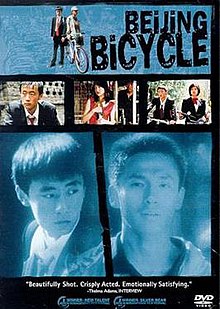Beijing Bicycle
- Cui Lin as Guei
- Li Bin Jian as
- Zhou Xun Qin
- Gau Yuan Yuan Xiao
- Li Shuang as Da Huan
Beijing Bicycle (Chinese十七 岁 的 单车, Pinyin Shiqi sui de dān CHE), also known as The Bicycle Thief in Beijing, is a Chinese film from 2001, Vittorio de Sica is based on the film The Bicycle Thief (1948 ). Directed the drama led Wang Xiaoshuai, who also wrote the screenplay with Tang Danian, Peggy Chiao and Hsu Hsiao- Ming. The main role is played by Cui Lin.
Action
The destitute and illiterate 17 -year-old farm boy Guei comes from the Chinese countryside with great hopes in the big city Beijing to make a living and, after a few odd jobs, a well-paid job in a bicycle courier. He is transmitted and a modern mountain bike provided that he can pay off in the first months of responsibility. But shortly before the expiry of the time limit, the bike is stolen. He loses his job, but gets the promise to be able to return to work if he takes the wheel. In great despair he seeks and finds the wheel again using a mark which he has filed in the frame. It is in the possession of a high school student who claims to have bought it at a market. After much dispute between Guei and the Friends of the high school student we agree on a common use of the wheel.
Because of disputes with the high school students, the wheel is destroyed at the end, Guei gets nothing.
Background
The film provides not only many impressions from the Chinese everyday life also take a look at the Chinese understanding of the law, which can be understood with great difficulty from a European perspective. During a stolen object in European law always understanding and entirely owned by the robbed man, no matter what happened to it later acquires a Chinese with the correct purchase of an ( unknown ) thief also share possession of the goods. The responsibility of the buyer on the legality of the purchase is secondary to the rights of an owner.
Xiaoshuai used this issue to give the viewer a glimpse of modern China, where successful Neokapitalisten and workers spatially close together, but live culturally distant from each other.
Publications
The film was first presented on 17 February 2001 at the 51st International Film Festival in Berlin and shown in the following months to several film festivals, including the International Film Festival in Karlovy Vary. On 28 March 2002, the film opened in theaters in the German-speaking Switzerland and the German cinemas. Was published in 2004 in Germany, the DVD edition.
Reception
The critics took the film on differently. For one, it was criticized that Beijing Bicycle to a big drama out of a missing bike make, on the other hand, the film is a fascinating look at modern China. The time wrote: ". A dazzling balancing act on the fault lines of contemporary China " The world said ". An example of all the cinematic brilliance that goes into the Chinese independent cinema " Der Spiegel noted, " " Beijing Bicycle " is a cinematically atmospheric -made snapshot of youth in an Asian city. "
Awards
At the Berlinale, the film in the competition was represented for the Golden Bear, but stood behind Patrice Chéreau's Intimacy Adult Drama. Wang Xiaoshuai won the Silver Bear Grand Jury Prize, Cui Lin and Li Bin was awarded as an actor with the Young Investigator Award.
On the Singapore International Film Festival, the film was nominated for Best Asian Film, but could not prevail against Shinji Aoyama's Eureka.
At the ceremony for the Satellite Awards in Los Angeles in 2002 Beijing Bicycle was nominated for Best Foreign Language Film, but the Bosnian anti-war film No Man 's Land won.










